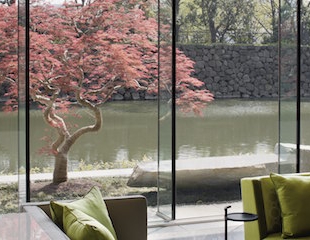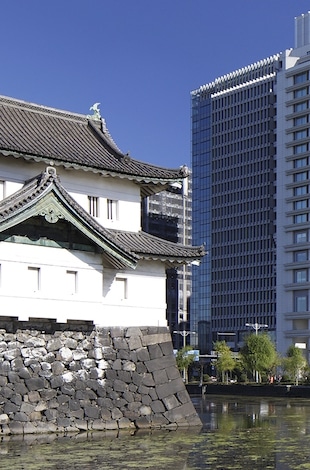terms & conditions of accommodation contracts
SCOPE OF APPLICATION
Article 1.
1. Contracts for accommodation and related agreements to be entered into between Palace Hotel Tokyo (the “Hotel”) and the Guest to be accommodated shall be subject to these Terms and Conditions for Accommodation Contracts. Any particulars not provided for herein shall be governed by laws and regulations, etc. (meaning laws and regulations and/or anything pursuant to such laws and regulations, and the same shall apply hereinafter), and/or generally accepted practices.
2. In the case where the Hotel has entered into a special contract with the Guest insofar as such special contract does not violate laws and regulations, etc. and generally accepted practices, notwithstanding the preceding Paragraph, the special contract shall take precedence over the provisions of these Terms and Conditions for Accommodation Contracts.
APPLICATION FOR ACCOMMODATION CONTRACTS
Article 2.
1. The Guest who intends to make an application for an Accommodation Contract with the Hotel shall notify the Hotel of the following particulars:
(1) Name of the Guest(s);
(2) Date(s) of accommodation and estimated time of arrival;
(3) Accommodation Charges (based, in principle, on the Basic Accommodation Charges listed in Table No.1, attached);
(4) (a) Name of the person applying for an Accommodation Contract and his/her contact information;
(b) Name of the person paying for the accommodation charges and his/her contact information; and
(5) Other particulars deemed necessary by the Hotel.
2. If the Guest requests, during his/her stay, an extension of the accommodation beyond the date(s) in Subparagraph (2) of the preceding Paragraph, it shall be regarded as an application for a new Accommodation Contract at the time such request is made.
CONCLUSION OF ACCOMMODATION CONTRACTS, ETC.
Article 3.
1. An Accommodation Contract shall be deemed to have been concluded when the Hotel has duly accepted the application as stipulated in the preceding Article. However, the same shall not apply where it has been proved that the Hotel has not accepted the application.
2. When an Accommodation Contract has been concluded in accordance with the provisions of the preceding Paragraph, the Guest is requested to pay an accommodation deposit fixed by the Hotel within the limits of Basic Accommodation Charges covering the Guest’s entire period of stay by the date specified by the Hotel.
3. The deposit shall be first used for the total Accommodation Charges to be paid by the Guest, then secondly for the cancellation charges under Article 6 and thirdly for the reparations under Article 18 as applicable, and the remainder, if any, shall be refunded at the time of payment of the Accommodation Charges as stated in Article 12.
4. When the Guest has failed to pay the deposit by the date as stipulated in Paragraph 2, the Hotel shall treat the Accommodation Contract as invalid. However, the same shall apply only in the case where the Guest is thus informed by the Hotel when the period of payment of the deposit is specified.
SPECIAL CONTRACTS REQUIRING NO ACCOMMODATION DEPOSIT
Article 4.
1. Notwithstanding the provisions of Paragraph 2 of the preceding Article, the Hotel may enter into a special contract requiring no accommodation deposit after the Contract has been concluded as stipulated in the same Paragraph.
2. In the case where the Hotel has not requested the payment of the deposit as stipulated in Paragraph 2 of the preceding Article and/or has not specified the date of the payment of the deposit at the time the application for an Accommodation Contract has been accepted, it shall be treated as that the Hotel has accepted a special contract prescribed in the preceding Paragraph.
REQUEST TO PROVIDE NECESSARY COOPERATION TO PREVENT THE SPREAD OF INFECTION
Article 4-2.
The Hotel may request cooperation from the Guest seeking accommodation pursuant to the provisions of Article 4-2, Paragraph 1 of the Hotel Business Act (Act No. 138 of 1948).
REFUSAL TO ENTER INTO ACCOMMODATION CONTRACTS
Article 5.
The Hotel may refuse to conclude an Accommodation Contract under any of the following cases. However, this Paragraph shall not mean that the Hotel may refuse accommodation in cases other than those listed in Article 5 of the Hotel Business Act.
(1) When the application for accommodation does not conform to the provisions of these Terms and Conditions;
(2) When the Hotel is fully booked and no room is available;
(3) When the Guest seeking accommodation is deemed liable to conduct him/herself in a manner that will contravene the laws and regulations or act against the public order or good morals in regard to his/her accommodations;
(4) When the Guest seeking accommodation is a patient, etc. of a specified infectious disease (hereinafter referred to as “patient, etc. of a specified infectious disease”) stipulated in Article 4-2, Paragraph 1, Item 2 of the Hotel Business Act;
(5) When the Guest seeking accommodation is an organized crime group, a member or an associate member of an organized crime group, an enterprise related to an organized crime group, a corporate racketeer or the like, a miscreant advocating political activism, an intellectual crime group, a quasi-organized crime group or any other crime group and/or any other anti-social forces;
(6) When the Guest seeking accommodation is a corporation or any other organization whose business activities are controlled by an organized crime group or by a member of an organized crime group;
(7) When the Guest seeking accommodation is a corporation and one of its executive officers is a member of an organized crime group;
(8) When the Guest seeking accommodation makes any coercive and/or unreasonable demand against the Hotel or Hotel employee such as violence, threats and blackmail, or requests the Hotel or Hotel employee to assume any burden beyond a reasonable range, or is deemed to have taken such action(s) in the Hotel or other Hotel(s) in the past (except when the Guest seeking accommodation is demanding to eliminate a social barrier pursuant to the provisions of Article 7, Paragraph 2 or Article 8, Paragraph 2 of the “Act for Eliminating Discrimination against Persons with Disabilities” (Act No. 65 of 2013, hereinafter referred to as the “Act for Eliminating Discrimination against Persons with Disabilities”));
(9) When the Guest seeking accommodation makes repeated demands to the Hotel which are so burdensome that they may seriously impede the provision of accommodation-related services to other staying guests, as stipulated in Article 5-6 of the Ordinance of Enforcement of the Hotel Business Act;
(10) When the Hotel is unable to accept a request for accommodation due to natural disasters, dysfunction of facilities or other unavoidable causes;
(11) When the Guest seeking accommodation does not provide all the information required under Article 8;
(12) When the Guest seeking accommodation is known to use the Hotel for purposes other than accommodations in advance (including but not limited to parties, gatherings, and/or any business activities such as exhibitions, sales events or commercial photo shoots without the prior approval of the Hotel);
(13) When the Guest seeking accommodation is intoxicated, etc. and is deemed likely to cause other guests to feel disturbed, in danger, threatened or unsafe (as stipulated in the provisions of Article 5 of the Tokyo Metropolitan Ordinance for Enforcement of the Hotel Business Act.)
EXPLANATION OF REFUSAL TO ENTER INTO ACCOMMODATION CONTRACTS
Article 5-2.
In the event the Hotel refuses to enter into an Accommodation Contract in accordance with the preceding Article, the Guest seeking accommodation may request the Hotel to explain the reasons for such refusal.
RIGHT TO CANCEL ACCOMMODATION CONTRACTS BY THE GUEST
Article 6.
1. The Guest is entitled to cancel the Accommodation Contract by so notifying the Hotel.
2. In the case where the Guest has cancelled the Accommodation Contract in whole or in part due to causes for which the Guest is liable (except in the case where the Hotel has requested the payment of the deposit during the specified period as prescribed in Article 3, Paragraph 2 and the Guest has cancelled before the payment), the Guest shall pay cancellation charges as listed in Table No. 2, attached. However, in the case where a special contract as prescribed in Article 4, Paragraph 1 has been concluded, the same shall apply only when the Guest is informed of the obligation of the payment of the cancellation charges in case of cancellation by the Guest.
3. In the case where the Guest does not arrive at the Hotel by 8:00 pm of the accommodation date (or within two hours after the expected time of arrival that the Hotel has been notified of) and fails to notify the Hotel in advance, the Hotel may regard the Accommodation Contract as being cancelled by the Guest.
RIGHT TO CANCEL ACCOMMODATION CONTRACTS BY THE HOTEL
Article 7.
1. The Hotel may cancel an Accommodation Contract under any of the following conditions below. However, this Paragraph shall not mean that the Hotel may refuse accommodation in cases other than those listed in Article 5 of the Hotel Business Act.
(1) When the Guest is deemed liable to conduct him/herself or is found to have conducted him/herself in a manner that will contravene the laws and regulations or act against the public order or good morals in regard to his/her accommodations;
(2) When the Guest is a patient, etc. of a specified infectious disease;
(3) When the Hotel is unable to provide accommodation to Guests due to reasons of force majeure such as natural disasters, etc.;
(4) When the case falls under provisions of Article 5 of the Tokyo Metropolitan Ordinance for Enforcement of the Hotel Business Act;
(5) When the Guest is an organized crime group, a member or an associate member of an organized crime group, an enterprise related to an organized crime group, a corporate racketeer or the like, a miscreant advocating political activism, an intellectual crime group, a quasi-organized crime group or any other crime group and/or any other anti-social forces;
(6) When the Guest is a corporation or any other organization whose business activities are controlled by an organized crime group or by a member of an organized crime group;
(7) When the Guest is a corporation and one of its executive officers is a member of an organized crime group;
(8) When the Guest engages in a behavior causing significant disturbance to other guests;
(9) When the Guest makes any coercive and/or unreasonable demand against the Hotel or Hotel employee such as violence, threats and blackmail, or requests the Hotel or Hotel employee to assume any burden beyond a reasonable range, or is deemed to have taken such action(s) in the Hotel or other Hotel(s) in the past (except when the Guest demands to eliminate a social barrier pursuant to the provisions of Article 7, Paragraph 2 or Article 8, Paragraph 2 of the “Act for Eliminating Discrimination against Persons with Disabilities”);
(10) When the Guest makes repeated demands to the Hotel which are so burdensome that they may seriously impede the provision of accommodation-related services to other staying guests, as stipulated in Article 5-6 of the Ordinance of Enforcement of the Hotel Business Act;
(11) When the Guest does not provide all the information required under Article 8;
(12) When the Guest is found to have used the Hotel for purposes other than accommodations (including but not limited to parties, gatherings, and/or any business activities such as exhibitions, sales events or commercial photo shoots without the prior approval of the Hotel); and
(13) When the Guest is found to be smoking in bed or tampering with fire extinguishing equipment or does not follow any other prohibited matters as stipulated in the Hotel Rules (limited to matters necessary to prevent fires).
2. When the Hotel cancels an Accommodation Contract pursuant to the provisions of the preceding Paragraph, the Hotel will not collect any fees for accommodation services, etc. which were not provided to the Guest prior to such cancellation.
EXPLANATION OF CANCELLATION OF ACCOMMODATION CONTRACTS
Article 7-2.
In the event the Hotel cancels an Accommodation Contract in accordance with the preceding Article, the Guest may request the Hotel to explain the reasons for such cancellation.
REGISTRATION FOR ACCOMMODATION
Article 8.
1. The Guest shall register the following particulars at the Hotel Reception on the day of accommodation:
(1) Name, address and telephone number of the Guest(s);
(2) Nationality and passport number for any foreign national without a residential address in Japan; and
(3) Other particulars deemed necessary by the Hotel.
2. When the Guest intends to pay his/her Accommodation Charges prescribed in Article 12 by any means other than Japanese currency, such as hotel gift certificates or credit cards, such payment method shall be presented in advance at the time of the registration prescribed in the preceding Paragraph.
3. For a foreign national, the Guest will be asked to present a passport for identification, and a copy will be taken by the Hotel. However, this shall not apply to an alien registration card holder or a residence card holder.
OCCUPANCY HOURS OF GUESTROOMS
Article 9.
1. The Guest may occupy the contracted guestroom of the Hotel from 3:00 pm to 12:00 pm (noon) of the following day. However, when the Guest is accommodated at the Hotel consecutively, the Guest may occupy the guestroom all day long, except for the days of arrival and departure.
2. The Hotel may, notwithstanding the provisions prescribed in the preceding Paragraph, permit the Guest to occupy the guestroom beyond the time prescribed in the same Paragraph. In this case, extra charges shall be paid as follows:
(1) Up to three (3) hours: one third of the room charge;
(2) Up to six (6) hours: one half of the room charge; and
(3) More than six (6) hours: room charge in full.
OBSERVANCE OF HOTEL RULES
Article 10.
The Guest shall observe the Hotel Rules established by the Hotel, which are posted within the guestroom TV.
BUSINESS HOURS
Article 11.
The business hours of the Hotel’s main facilities shall be notified within brochures, websites, displays in various locations, as well as the guestroom TV.
PAYMENT OF ACCOMMODATION CHARGES
Article 12.
1. The breakdown of the Accommodation Charges, etc. to be paid by the Guest is as listed in the Table 1, attached.
2. Accommodation Charges, etc. prescribed in the preceding Paragraph shall be paid in Japanese currency or by other means recognized by the Hotel such as hotel gift certificates or credit cards at the Reception at the time of the Guest’s departure or upon request by the Hotel.
3. Accommodation Charges shall be paid even if the Guest voluntarily does not utilize the accommodation facilities provided for him/her by the Hotel.
LIABILITIES OF THE HOTEL
Article 13.
1. The Hotel shall compensate the Guest for any damage if the Hotel has caused such damage to the Guest in the fulfillment or nonfulfillment of the Accommodation Contract and/or related agreements. However, the same shall not apply in the case where such damage has been caused due to reasons for which the Hotel is not liable.
2. The Hotel is covered by the Hotel Liability Insurance in order to deal with unexpected fires and/or other disasters.
HANDLING OF CIRCUMSTANCES WHEN UNABLE TO PROVIDE CONTRACTED ROOMS
Article 14.
1. When the Hotel is unable to provide the Guest with the contracted guestroom, the Hotel shall obtain the Guest’s consent and arrange accommodation of the same standard elsewhere for the Guest insofar as practical.
2. When arrangement of other accommodation cannot be made notwithstanding the provisions of the preceding Paragraph, the Hotel shall pay the Guest a compensation fee equivalent to the cancellation charges and the said compensation fee shall be applied to the compensation of damages. However, when the Hotel cannot provide accommodation due to causes for which the Hotel is not liable, the Hotel shall not pay the Guest a compensation fee.
HANDLING OF DEPOSITED ARTICLES
Article 15.
1. The Hotel shall compensate the Guest for the damage when loss, breakage or other damage is caused to the goods, cash or valuables deposited at the Reception by the Guest, except in the case when this has occurred due to causes of force majeure. However, in the case of cash and valuables, if the Hotel requests the Guest to declare the type and value but the Guest fails to do so, the Hotel shall compensate the Guest within the limits of 200,000 yen.
2. The Hotel shall compensate the Guest for the damage when loss, breakage or other damage is caused, through intention or negligence on the part of the Hotel, to the goods, cash or valuables which are brought into the premises of the Hotel by the Guest but are not deposited at the Reception. However, for articles of which the type and value has not been declared in advance by the Guest, the Hotel shall compensate the Guest within the limits of 200,000 yen, except in the case where loss or damage was caused intentionally or by gross negligence on the part of the Hotel.
CUSTODY OF BAGGAGE AND/OR BELONGINGS OF THE GUEST
Article 16.
1. When the baggage of the Guest arrives at the Hotel before his/her arrival, the Hotel shall be liable to keep it only in the case when such a request has been accepted by the Hotel in advance. The baggage shall be handed over to the Guest at the Reception at the time of the Guest’s check-in.
2. When the baggage or belongings of the Guest are found after the Guest’s check-out, and the ownership of the article is confirmed, the Hotel shall contact the owner of such article and ask for further instructions. When no instruction is given to the Hotel by the owner or when the ownership is not confirmed, the Hotel shall keep the article for seven (7) days including the day it is found, and turn it over to the nearest police station thereafter.
3. The Hotel’s liability in regard to the custody of the Guest’s baggage and belongings in the case of the preceding two Paragraphs shall be assumed in accordance with the provisions of Paragraph 1 of the preceding Article in the case of Paragraph 1, and with the provisions of Paragraph 2 of the same Article in the case of Paragraph 2.
LIABILITY IN REGARD TO PARKING
Article 17.
The Hotel shall not be liable for the custody of the vehicle of the Guest when the Guest utilizes the parking lot within the premises of the Hotel, as it shall be regarded that the Hotel simply offers the space for parking, whether the key of the vehicle has been deposited with the Hotel or not. However, the Hotel shall compensate the Guest for the damage caused through intention or negligence on the part of the Hotel in regard to the management of the parking lot.
LIABILITY OF THE GUEST
Article 18.
The Guest shall compensate the Hotel for the damage caused through intention or negligence on the part of the Guest.
ENTERING OF THE GUESTROOM
Article 19.
A staff member of the Hotel may enter a guestroom without the Guest’s permission even after the conclusion of the Accommodation Contract in the following cases:
(1) When providing Hotel services such as housekeeping and in-room dining;
(2) When an act violating the Hotel Rules or concerns about such acts are confirmed; and
(3) When it is judged necessary to enter the guestroom under the guidance of the police and/or the fire department.
PERSONAL INFORMATION
Article 20.
Personal information of the Guest provided to the Hotel will be used for the sole purpose of performing the Hotel services within the Hotel. The Hotel will never share or disclose the personal information of the Guest with a third party without the Guest’s consent. However, this will not apply in the case the police, the fire department or the administrative agency instructs otherwise.
ATTACHED TABLE NO. 1
Breakdown of Accommodation Charges, etc.
(Ref. Paragraph 1 of Article 2 and Paragraph 1 of Article 12)
[Breakdown of the total charges payable by the Guest]
Accommodation Charges:
(1) Basic Accommodation Charge (Room charge)
(2) Service Charge (1) x 15%
(3) Taxes (a) Consumption Tax (b) Tokyo Metropolitan Accommodation Tax
Additional Charges:
(4) Meals, drinks and other expenses
(5) Service Charge (4) x 15%
(6) Tax (c) Consumption Tax
Calculation of Taxes:
(a) Consumption tax ((1) + (2)) x 10%
(b) Tokyo Metropolitan Accommodation Tax
When the total amount of Basic Accommodation Charge and Service Charge per person per night is:
JPY10,000 to JPY14,999, then JPY100; or
JPY15,000 or more, then JPY200
(c) Consumption Tax ((4) + (5)) x 10%
Remarks: If the tax law is revised, the revised provisions shall apply.
ATTACHED TABLE NO. 2
Cancellation Charge
(Ref. Paragraph 2 of Article 6)
- For bookings of nine (9) rooms or less:
– A no-show or cancellation on the day of or one day prior to arrival: 100% - For bookings of 10 to 50 rooms:
– A no-show or cancellation on the day of or one day prior to arrival: 100%
– A cancellation of 2 to 10 days prior to arrival: 80%
– A cancellation of 11 to 20 days prior to arrival: 50% - For bookings of 51 rooms or more:
– A no-show or cancellation on the day of or one day prior to arrival: 100%
– A cancellation of 2 to 10 days prior to arrival: 80%
– A cancellation of 11 to 20 days prior to arrival: 50%
– A cancellation of 21 to 30 days prior to arrival: 30%
(Remarks)
1. The percentage signifies the rate of cancellation charge to the Basic Accommodation Charges.
2. If the number of days for the Accommodation Contract is shortened when a cancellation charge would apply, the above percentage of the Basic Accommodation Charges for the first day shall be paid by the Guest as the cancellation charges.
3. The Hotel may set forth a different cancellation charges to the above for accommodation packages planned by the Hotel or for specific groups and/or dates.

Terms & Conditions
Hotel Rules



